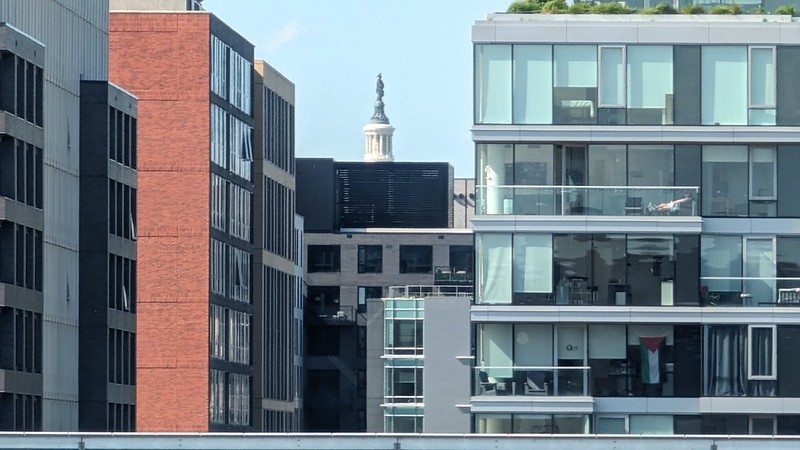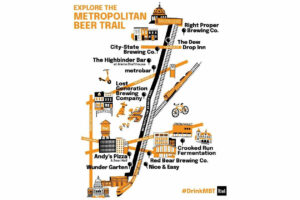
photo by Victoria Pickering
Jenny Hunter is a labor lawyer, policy consultant and freelance writer living in Ward 4.
PoP-Ed. posts may be written about anything related to the District and submitted via email to princeofpetworth(at)gmail please include PoP-Ed. in the subject line.
“In 2018, when DC voters last considered an initiative to phase out the subminimum wage for tipped workers, the restaurant industry unleashed a well-funded campaign of sketchy arguments and fearmongering, dressed up as concern for workers. It didn’t sway voters, who decisively approved Initiative 77. But the industry convinced the DC City Council to thumb its nose at voters and repeal the measure.
This November’s ballot includes Initiative 82, a near-replica of I-77. I-82 would gradually raise the tipped subminimum wage of $5.35 so that by 2027 tipped workers would earn at least the regular minimum wage, now $16.10, with tips on top of that. Yes, that’s right, today tipped workers in DC can be paid $5.35 per hour–just a smidge more than the federal minimum wage in 1997, when DVD players first became available in the US and “SpiceWorld: The Movie” came out.
So, the restaurant industry is dusting off its specious old arguments.
Voters should reject them again. Forcing workers to rely on tips for the bulk of their income subjects them to economic insecurity, poverty, and harassment. The experience of the eight other states that have eliminated the subminimum wage demonstrates that, far from harming workers, the change has been good for both workers and businesses.
Tipped workers are not all servers at high-end restaurants; they also include nail technicians and parking attendants. Sometimes tipped workers make more than minimum wage including tips, but if, say, a pandemic hits, or it’s rainy and business is slow, or customers are in a bad mood, they may not. Employers are supposed to make up the difference if this happens, but wage theft is common; many just don’t.
As a result, the tipped workforce, which is disproportionately made up of women and people of color, has a poverty rate nearly twice that of non-tipped workers. Tipped workers also experience higher levels of sexual harassment and other forms of mistreatment from the customers whose whims determine most of their pay.
It is not hard to see why many restaurant and bar owners support the current system. But “We Would Like to Continue Shifting Our Business Risk Onto Low-Wage Employees” isn’t a good campaign message. So instead the industry makes the baseless argument that raising tipped workers’ wages would leave workers with less money. In 2018, the “Vote No” campaign supplied servers and bartenders with “Save our Tips” pins. This year their campaign website predicts that restaurants “are likely to institute a service charge and eliminate tipping.” Since I-82 explicitly states that tips remain the property of workers and are in addition to wages, this is effectively a threat from the industry: nice income you’ve got there, it would be a shame if we took it away from you.
But the threat is nonsensical. As a matter of simple math, if customers already pay enough in menu prices plus tips to cover the minimum wage, requiring employers to pay minimum wage directly won’t require them to charge customers more in total, or to pay workers less. Many DC restaurants already instituted service charges during the pandemic so they could pay workers a stable, higher base wage, and very few instruct customers not to tip.
The experience of the eight other states that have already eliminated the tipped subminimum wage also demonstrates that the industry’s apocalyptic predictions are unfounded. In those states tipped workers have lower rates of poverty and higher hourly earnings, and businesses have higher employment growth, than in states with subminimum wages for tipped workers. When you travel to other states, you probably don’t check to see what the tipped minimum wage is before deciding how much to tip; you just tip based on your general practice and how good the service was (and, I hope, always at least 20%).
In both 2018 and today, the restaurant industry has tried to bolster its credibility by claiming its views are those of workers, as with the “Save our Tips” pins. While some workers presumably do oppose the initiatives, many likely feel pressured by their employers to back the “Vote No” campaign. One tipped worker who supported I-77 in 2018 declined to tell the Washington Post where she worked, saying that she and many other workers, especially immigrants, feared retaliation if they spoke up.
Changes in the membership of the D.C. Council since 2018 mean that if voters approve I-82 this year, the Council is unlikely to reverse their decision. Voters should again put common sense and fairness over funny math and misinformation, and eliminate the tipped subminimum wage for good.”
Recent Stories

Photo by Tim Brown Ed. Note: If this was you, please email [email protected] so I can put you in touch with OP. “Dear PoPville, Thursday night (April 18th) we were…

For many remote workers, a messy home is distracting.
You’re getting pulled into meetings, and your unread emails keep ticking up. But you can’t focus because pet hair tumbleweeds keep floating across the floor, your desk has a fine layer of dust and you keep your video off in meetings so no one sees the chaos behind you.
It’s no secret a dirty home is distracting and even adds stress to your life. And who has the energy to clean after work? That’s why it’s smart to enlist the help of professionals, like Well-Paid Maids.

Unlock Peace of Mind for Your Family! Join our FREE Estate Planning Webinar for Parents.
🗓️ Date: April 25, 2024
🕗 Time: 8:00 p.m.
Metropolitan Beer Trail Passport
The Metropolitan Beer Trail free passport links 11 of Washington, DC’s most popular local craft breweries and bars. Starting on April 27 – December 31, 2024, Metropolitan Beer Trail passport holders will earn 100 points when checking in at the
DC Day of Archaeology Festival
The annual DC Day of Archaeology Festival gathers archaeologists from Washington, DC, Maryland, and Virginia together to talk about our local history and heritage. Talk to archaeologists in person and learn more about archaeological science and the past of our






